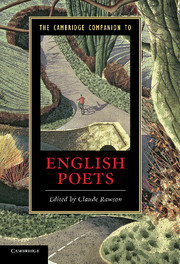Book contents
- Frontmatter
- Introduction
- 1 Geoffrey Chaucer
- 2 Thomas Wyatt
- 3 Edmund Spenser
- 4 William Shakespeare
- 5 John Donne
- 6 Ben Jonson
- 7 George Herbert
- 8 John Milton
- 9 Andrew Marvell
- 10 John Dryden
- 11 Jonathan Swift
- 12 Alexander Pope
- 13 William Blake
- 14 Robert Burns
- 15 William Wordsworth
- 16 Samuel Taylor Coleridge
- 17 George Gordon, Lord Byron
- 18 Percy Bysshe Shelley
- 19 John Keats
- 20 Alfred Lord Tennyson
- 21 Robert Browning
- 22 Emily Brontë
- 23 Christina Rossetti
- 24 Thomas Hardy
- 25 William Butler Yeats
- 26 D. H. Lawrence
- 27 T. S. Eliot
- 28 W. H. Auden
- 29 Philip Larkin
- Further Reading
- Index
29 - Philip Larkin
Published online by Cambridge University Press: 28 May 2011
- Frontmatter
- Introduction
- 1 Geoffrey Chaucer
- 2 Thomas Wyatt
- 3 Edmund Spenser
- 4 William Shakespeare
- 5 John Donne
- 6 Ben Jonson
- 7 George Herbert
- 8 John Milton
- 9 Andrew Marvell
- 10 John Dryden
- 11 Jonathan Swift
- 12 Alexander Pope
- 13 William Blake
- 14 Robert Burns
- 15 William Wordsworth
- 16 Samuel Taylor Coleridge
- 17 George Gordon, Lord Byron
- 18 Percy Bysshe Shelley
- 19 John Keats
- 20 Alfred Lord Tennyson
- 21 Robert Browning
- 22 Emily Brontë
- 23 Christina Rossetti
- 24 Thomas Hardy
- 25 William Butler Yeats
- 26 D. H. Lawrence
- 27 T. S. Eliot
- 28 W. H. Auden
- 29 Philip Larkin
- Further Reading
- Index
Summary
Philip Larkin owed his life’s work to Thomas Hardy. He himself expressed his debt in general terms, saying that Hardy’s poems taught him ‘to feel rather than to write … to have confidence in what one felt’, and the feeling they taught him principally to have confidence in was sadness. He recalled, specifically, the importance to him of Hardy’s ‘Thoughts of Phena at News of her Death’, but he could surely also have cited ‘In Tenebris (II)’: ‘Delight is a delicate growth cramped by crookedness, custom, and fear.’
Larkin’s promising career seemed to be over by his mid-twenties. A period of intense creativity that began when he graduated from Oxford in 1943 had produced a volume of poems ( The North Ship, 1945) and two novels (Jill, 1946, and A Girl in Winter, 1947). Now his attempts to write a third novel stalled, while a second volume of poems failed to attract a publisher. He was working in a provincial library and ‘beginning to find out what life was about’, or what Hardy had called ‘unsuccess’. His poems hitherto, with their aspirations to W. B. Yeats and Dylan Thomas, their exalted sense of himself and of the poetic, had been vague, allegorical, ‘euphemistic’ (in Barbara Everett’s word). Now Hardy showed him the possibilities of directness, and of his own ‘commonplace’ reality. Even more, Hardy seemed to endorse his vision of life’s unfairness, of humanity as a series of oppressions and of ‘the solving emptiness / That lies just under all we do’ (‘Ambulances’: all citations of Philip Larkin’s poetry here are from the Collected Poems, 1988).
The young Larkin was excited by a very different vision, ecstatic and (theoretically) ‘something to do with sex’. ‘Life’, he confidently told a friend, was ‘principally suffering unprovoked sorrow and joy’. But he also suffered unrequited longing, while joy mostly meant escape from the ‘curious tense boredom’ of his home, the tyranny of obligation, into art, male friendship, D. H. Lawrence, and jazz.
- Type
- Chapter
- Information
- The Cambridge Companion to English Poets , pp. 525 - 537Publisher: Cambridge University PressPrint publication year: 2011



